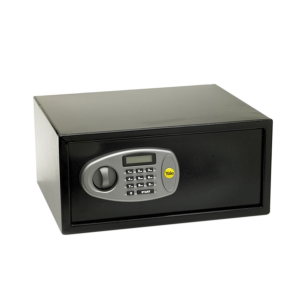Protecting company data - why businesses are investing in laptop safes
In the modern business world, an organisation will be producing data every second of every day. This data comes in many different forms, and has different levels of value, and indeed it has value to different types of people, but the organisation has to treat all types of data the same, and that means it all needs protecting. Cloud storage is a popular form of data security in the digital age, but many organisations also like to have a form of security on a local basis, and because the majority of data is produced via laptops, a laptop safe is a good form of security in a physical sense and will satisfy this need for flexible and effective data security.
What data does a business produce?
If you are a construction company or you sell cars, you might not think you produce much data, but that doesn’t exclude you from current data protection regulations. In fact, even a one-man band, a self-employed plumber for example, needs to carefully manage how data is produced, shared, stored and accessed.
Typical data produced by an organisation of any size can include:
- Employee data – Personal data such as name, age, gender, medical history and bank details, as well as contact information such as home address, email address, phone numbers and emergency contacts.
- Customer data – Similar contact information as above, but also sales history information, including credit card details, credit scores, purchase history and debt records.
- Intellectual property – Unique and confidential information about the organisation’s product or service that gives it a commercial advantage, such as branding and product specifications. This can also include copyright and patent information.
- Legal information – Details of employment contracts, customer contracts, equipment contracts or building contracts and property deeds.
- Human resources information – Personal information relating to disciplinary issues, grievances, disputes, appraisals and salaries.
- Financial information – Company accounts, investments, capital expenditure and performance.
There are many reasons why an organisation would want to keep this kind of data secure, not least the data protection regulations, which gives individuals more control over how their personal data is used and stored by organisations. Every business is bound by these regulations, so this dictates that they must have strict controls in place over how data is stored and shared. But there are other common security threats where data is concerned also.
What security threats are there for data produced by a business?
Common security threats concerning the data produced by a business include:
- Cybercriminals – Personal data can be a valuable asset for cybercriminals who can steal information and sell it for various purposes, usually for spam marketing, but this can also be used for criminal practices, such as identity theft or telephone scams.
- Commercial threats – A rival business can gain a competitive commercial advantage if they gain access to forms of data relating to intellectual property. This also applies to contract information and any form of customer data and financial information. This could seriously impact on the commercial standing of the business in the marketplace.
- Internal threats – There could be occasions where internal conflict results in rival departments seeking to gain information, or where colleagues in the same department discover information relating to each other’s salaries or appraisal performance. This can cause a threat to staff turnover and internal morale and can therefore impact on the company culture and productivity.
- Opportunist thieves – Of course the most obvious security threat is thieves seeking to steal laptops for their financial value alone. Laptops have good resale value and therefore are a source of quick and easy money, and given that modern laptops are much smaller and lighter than they used to be, they are a more common target.
How does a business guard against data theft?
The best way for a business to safeguard data theft is to secure laptops against theft and unauthorised use. This can be done by investing in a laptop safe. A laptop safe is a small type of front-loaded safe that is made from reinforced steel. It is accessed via a digital keypad and a unique code that is only shared between authorised people. This code can be changed if it is felt there has been a security breach.
Laptop safes can be portable for convenience, or they can be located permanently by using the pre-drilled bolt holes to secure the safe to a wall or floor, or concealed in a cupboard. By investing in laptop safes a business is able to secure laptops when they are not in use, such as overnight, when employees are on holiday or to help manage flexible working patterns. Employees can also use laptop safes at home for the same purpose, if they frequently use the laptop away from the office.
Order your laptop safe online from MB Direct
Make sure your business is doing everything it can to guard against data theft in the digital age. The data your business generates is probably more valuable than you realise, and there are lots of different security threats that want it. So make sure you have a robust and durable form of laptop security in place and order from our range of laptop safes today.